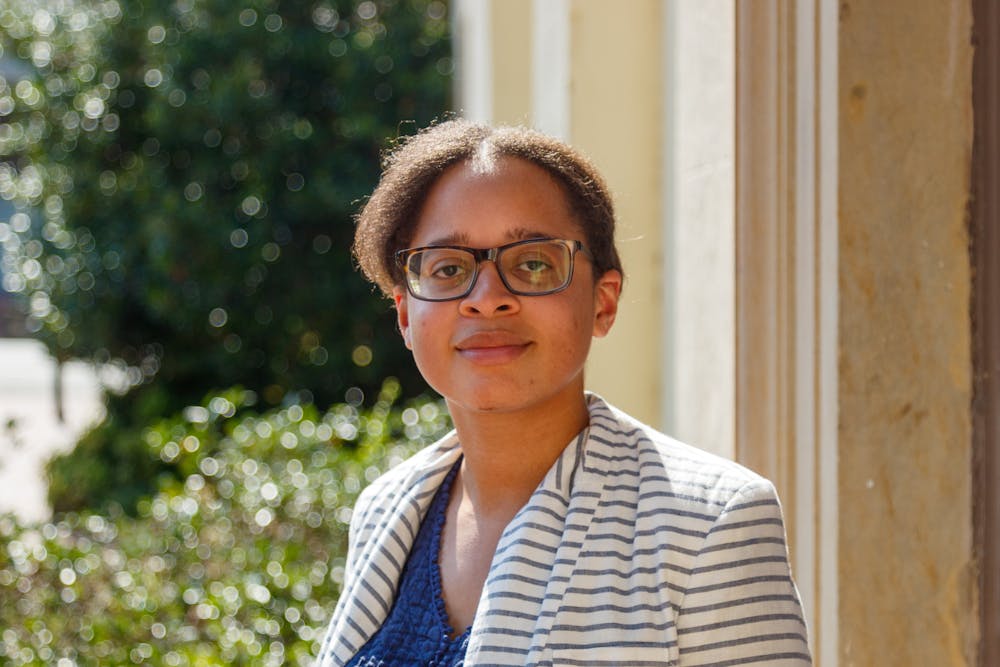Prior to Monday's situation, neither Hetherington nor Bassard received any University-specific training or preparation for such an event.
While Hetherington agrees that more training would have been helpful, he said doing such a thing on a college campus would be a “monumental task.”
Unlike Bassard and Hetherington, adjunct professor Giovanna Torrieri was finishing the end of her lecture when the alert showed up on her classroom projector. Only nine minutes before, her class was outside learning and practicing photojournalism techniques.
Torrieri, who was in only her third day of teaching at UNC, said that she was receiving more information from students messaging each other than the University.
“It’s a shock because I never would have thought in a million years that I would be experiencing something like that, let alone on my third day teaching,” Torrieri said.
Instead of being able to answer questions from her class, all Torrieri felt like she could do was “just hunker down with my students on lockdown until we were given the all clear.”
“I would hope that the next step would be to prepare faculty and students for a situation like this because it was hard,” Torrieri said. “I felt really bad being the person of authority in there and not being able to answer questions.”
Despite the fear that came with Monday’s events, Hetherington said he felt his department chair Mark Crescenzi and fellow faculty members helped to properly guide the response to the shooting, as well as the return to class.
“There's not one right way to respond to what the tragedy that happened here was,” Hetherington said.
In response to the tragedy, Bassard said she “wasn’t in the right headspace to be in the classroom yet” — and didn’t think her students would be in the right headspace either.
Bassard decided to cancel class Thursday. Although her goal is to “find some sense of normalcy” for the semester, Bassard’s focus is her students' well-being, and that Monday’s events would not dampen their experience at UNC or in higher education.
“College should be a new and exciting thing, not a new scary thing where they have to deal with so many horrible things in the world,” Bassard said.
To get the day's news and headlines in your inbox each morning, sign up for our email newsletters.
Since Bassard was “physically further away” from where the incident took place in Caudill Labs, she said she was able to process it differently from colleagues and friends who were closer. Despite the distance, Bassard said that safety is “more at the forefront” of her mind than it was before Monday.
“I don't want to say I feel safe on campus,” Bassard said. “I think safe is a strong word, phrase, for a very scary time.”
Since the incident, Torrieri has received support from fellow professors but feels that “University-wise, something does need to change.”
“As far as training, I would have liked to know ‘What is the protocol?’ ‘How can I help answer these questions [from] my students?’,” Torrieri said. “We were not prepped at all.”
In Hetherington’s political science courses, he talks about how the context of experiences shapes reactions and behaviors. Now, he is applying the same framework to help his students through their emotions and feelings from August 28.
“There's no one-size-fits-all kind of relief that we can provide people,” Hetherington said.
For Bassard, she plans to give her students two pieces of advice upon returning to class: feel your feelings and go vote.
“Your experience and how you feel coming out of this experience matters," Bassard said. “It's valid, do not be afraid of feeling the full range of everything that you feel when you're grieving.”
Hetherington said that “there’s really not one right way” to move forward. He encourages students to talk with others, whether that be parents, students or faculty.
“At this point, we just have to all do our best and provide each other grace and be willing to support people, wherever they are coming from,” Hetherington said.
@mayawaid
@dailytarheel | university@dailytarheel.com



